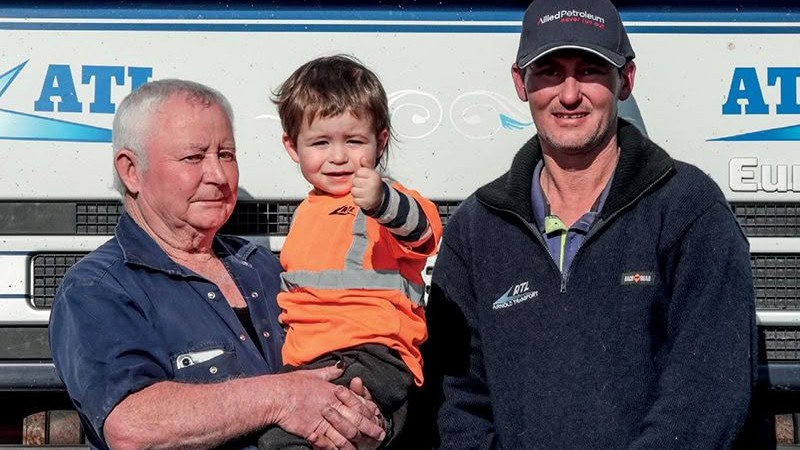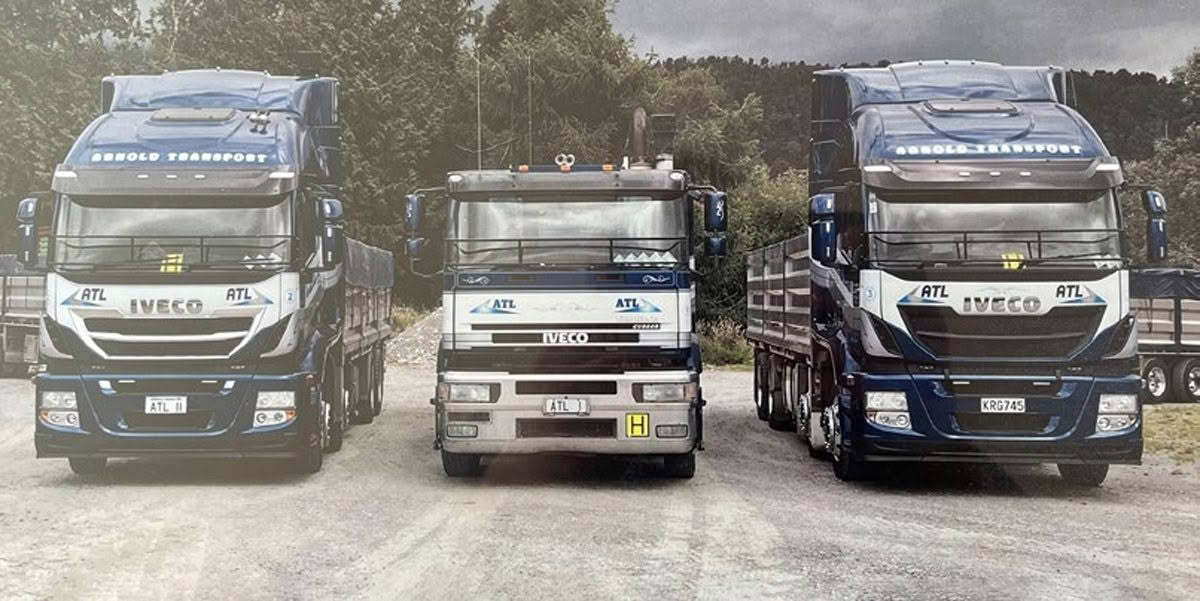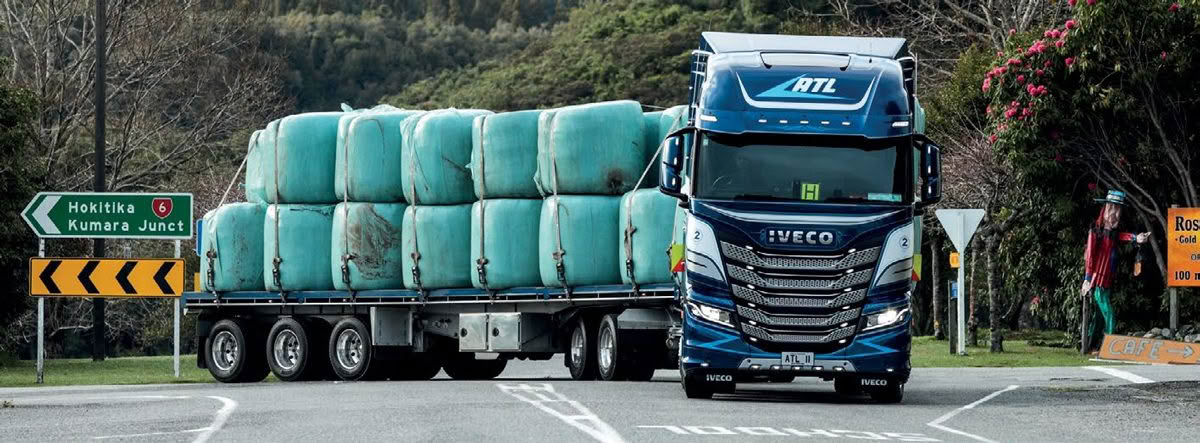Being bullish, and breaking a leg

We mentioned the wee South Westland village of Whataroa as being the closest settlement to the most isolated place on the state highway network, and it’s there that the story of Arnold Transport begins.
The Whataroa Garage run by Tommy’s grandfather Roy was the original family business, and well predates World War II. As was often the case in the era, a mail run owned by the business gradually morphed into its own transport sideline as those who had a means and licence for commercial transport could satisfy those with a demand. And there was no shortage of demand. Places like Whataroa and Hari Hari were not always the quiet hamlets we see today – rather, bustling service centres for vibrant regional economies with native timber, mining, and as today, farming industries all providing the commercial tinder.
In time, Tommy’s father Alan and uncle Les joined the business, as did Tommy himself.
“My father was a wonderful bloke,” says Tommy. “An absolute worker.”
A successful business – there’s a photo in the Arnolds office in Hari Hari showing a lineup of 13 trucks outside the Whataroa headquarters, the bulk of them Internationals. However, challenging times weren’t far away.
“They amalgamated with Ross Transport around 1970 but were sort of done a disservice by their bankers of the day because once they got in amongst it they found out it was stuffed, not making any money, and owed a bit of money. All they could do was get stuck in, and that’s what they did.
“They might have been all right but the decision was made down the track to buy Molloy Transport at Kaiata [just north of Greymouth]. Dad didn’t want to go near it but was outvoted and the effort required to make it all work was just too much – he worked himself to exhaustion for nothing. I remember him going to sleep one night five minutes from home and driving off the road. Just as well we didn’t have logbooks then.”
By 1973, the strain was beginning to show, and to rub salt into the wound, Northern Southland Transport Holdings (NSTH) and Transport Nelson Ltd (TNL) arrived in the area and simply “brushed us aside”.
“They ran a completely different operation. Our fleet was all about versatility – trucks would run up to Greymouth, Hokitika, or the rail at Ross, and always backload bulk or bagged fertiliser, hay, meal – whatever was needed. They had trucks dedicated to the task. I don’t know how they made it work.
“I read a book a while back that said together they formed Trans West, but the name Trans West originates with the Arnolds’ buyout of Ross Transport.”
Eventually Tommy went to work for the new Trans West driving a V10 Mercedes-Benz cattle truck, and it was an encounter with an angry bull on a fateful day up the Waitaha Valley that would reset the clock of destiny.
“The bastard broke me leg! It was a bit uncomfortable but I managed to get back to Ross and the forklift driver helped me load the sheep that made up the load.
“I was home convalescing and noticed one of the Haast-based Southwest Transport trucks running back and forth past home. The company was owned by Bruce Hutton, and he’d tendered for the annual Lands and Survey fertiliser and lime contracts in Haast, Whataroa and Hari Hari, and won them all. The annual contracts were a big deal, there were massive holdings in South Westland.


I rang him and said if he based a truck in Hari Hari, I’d run it and find additional work. But he’d got himself in a bit domestic strife and said ‘I’d love to Tommy, but I have to sell it. JJ [Nolan] wants a couple of licences, you should by a couple too.”
To put the younger readers in the picture, this was pre- deregulation and every truck in a fleet had to have a licence – essentially an authority to cart specific product within a specific area. It was a bureaucracy designed to protect rail. Licences could be bought from other carriers or new ones applied for through the courts, and any licence either applied for or under intended purchase from its existing owner could be contested in court by competitors or rail. It so happens that South Westland was one of the largest trucking areas in the country, with no rail influence between Cromwell and Ross, some 437km apart.
“I was only about 24 and decided to have a go. My wife and I got all the letters of support from locals; they were hugely supportive. The licences were domiciled in Haast but I thought if I had a phone number in Haast diverted to Hari Hari, I could make it work. The hearing was in Haast of course, and Judge Des Hogan presided. TNL and NSTH brought their gun lawyers; I only had the local Greymouth bloke who was not really a transport man. The bastards gave us an absolute ball-beating. I thought we were buggered, but in the lunch break, the lawyer there from Southland – for JJ I think – knew his stuff and said ‘you’re going about it wrong. Bin this now, and tell the judge you’re going to apply for two virgin licences in Whataroa where you want them’. It was a risk, but I did just that. Dad was pissed off I’d chucked it in on the day, but the guy was right.”
Tommy applied for the Whataroa licences and they all reconvened in Whataroa months later. “This time our case was much stronger and although he took three months to deliberate, we got them. Then about three months later after the appeal process, we applied for a third and got that, too.”
As frustrating as it was, the three months waiting for Judge Hogan to mull over the case proved invaluable. “We’d gone into it with only $9000 and we were broke, so I went to work driving a loader in forestry. It was a great job and they were wonderful people, so when I won the licences, they offered me the chance to put a truck in the roading work. That was great for cashflow.
“We started off with an ACCO and two V6 TM Bedfords – a gravel truck, a cattle truck and a log truck. The original yard was by the pub in Hari Hari, and man did those other pricks give us a hard time. A guy called Bill White came up from Southland to run Trans West and he told the staff they were to do nothing to assist T A Arnold in any way, not to stop to help if we were broken down, not to lend us so much as a shovel. They operated the local fert store, and at one stage, they even tried to coerce or look after the local fert rep, who turned up and told me I was no longer carting ex the store. One call to his head office and they were both sorted out – ‘load anyone who comes in or we’ll get someone else to run it’. It wasn’t long after that rep disappeared also.”
With great support from the locals and the Arnold work ethic in full swing, the business grew organically on the back of a single mantra – service, service, service.
Core bread and butter for the business was – and still is – rural support work. Fertiliser, feed, hay, timber, metal, and anything else required over and above that. “I’d cart metal all day in the forest, then do bulk or bagged fert and hay in the afternoon, evening and all weekend. She was non-stop, no wonder me back’s buggered!” Then he gives a bit of chuckle, “We used to take timber to Ōamaru in the Bedfords – bloody hell, it took forever!
“It’s actually a good life, I enjoyed it, but oh shit, it’s bloody hard on family. It’s not a business to be in if all you want is to make a lot of money. It’s a lifestyle. If we offered a service, we delivered it. The only thing that would stop us is weather or breakdowns.”
The original trucks gave way to International 3070s, followed by T-Lines, with an F12 and FL12 Volvo in the mix too. Spreading was also an integral part of the operation, with Mercedes-Benz 1113s filling that role. Just as it was in generations past, versatility was the hallmark of the fleet, which peaked at six in 2004.

In recent years there’s been the success story that are the IVECOs, and the brand can take a huge bow for its contribution in standing up generation four of the Arnold story.
“By 2004, I’d been in it for 30 years. We built it on the back of hard work and service but there was always someone nipping at your patch – they come in, do damage and leave you with what’s left. I was getting a bit buggered to be honest. Ryan wasn’t really on the scene as such, and I sold all but one to Aratuna Freighters. I talked to Durham [Havill – Aratuna Freighters] and said I wanted to retain one unit to keep me busy and we’d work in and help whenever possible. There was no restraint of trade, a gentlemen’s handshake that continues to work well. We have a great relationship with Bill [Millar – rural manager, Aratuna].”
Ryan (40) is the fourth generation in the Arnold business, active since about 2005-2006. “It’s really good having him in it, and watching him grow quietly and steadily. I think he’s up to five trucks now. It’s meant I’m really enjoying it again. He’s a chip off the old block, though, works his guts out.
“The farms are bigger now, and that makes piecing full loads together easier. We’ve got a fantastic crew of people also. I just can’t say enough, especially at times like now. They just stand up and do what needs to be done.”
At that point, Ryan enters with his wee son Case – generation five. He listens and adds a lovely footnote to what has been an amazing, and at times difficult, conversation for Tommy.
“We’re simply continuing to do what we’ve always done. Build a business based on service in a great rural community we grew up in, and want to remain a part of.”









